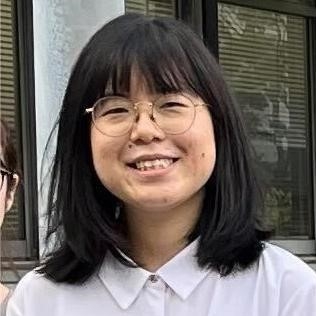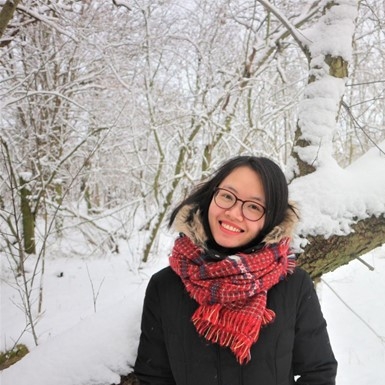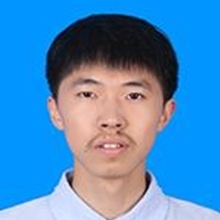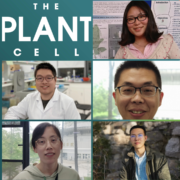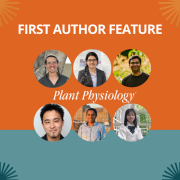The Plant Cell Features August First Authors
Behind the manuscripts are researchers, professors, professionals and students dedicated to advancing the field of plant science. You’ve seen our First Authors on Twitter and Facebook— now, read more about why they chose to pursue plant sciences and click on the links to read their articles.
Anthony Postiglione
Anthony Postiglione is the first author of Flavonols improve thermotolerance in tomato pollen during germination and tube elongation by maintaining ROS homeostasis published 05 August 2024. Postiglione is a Post-doctoral Researcher at Wake Forest University. Education background includes: 2023 Ph.D. Wake Forest University; 2018 M.S. North Carolina A&T State University; 2014 B.S. Florida State University. Research interests are Abiotic Stress, Plant sexual reproduction, Redox biology.Personal interests include Golfing, playing video games, and watching a variety of sports.
“My family lived on a plant nursery when I was a child, which sparked my interest in plant science at a very young age. This affinity was only cultivated further by my mentor Dr. Gloria Muday, who is a true embodiment of a plant biologist. Her guidance has played an integral part in developing me to be the scientist that I am today. “
Neetu Verma
Neetu Verma (she/her) is the First Author of MPK4-mediated phosphorylation of PHYTOCHROME INTERACTING FACTOR4 controls thermosensing by regulating histone variant H2A.Z deposition published 05 August 2024. She is a CSIR Senior Research Associate at National Institute of Plant Genome Research. Education background includes a 2018 Ph.D Department of Genetics at University of Delhi South Campus. Research interests include Cell and molecular biology, Thermosensing in plants and Plant genetics.Personal interests include Exploring new places, Gardening .
“Plant sciences have tremendous potential to solve various problems such as world food crisis and climate change.”
Pawittra Phookaew
Pawittra Phookaew (she/her) is the first author of Active protein ubiquitination regulates xylem vessel functionality published 02 August 2024. She is a Solution Scientist at Merck Ltd.. Education background includes: 2020 Ph.D in Biological Science at Nara Institute of Science and Technology; 2017 MSc in Biological Science at Nara Institute of Science and Technology; 2013 MSc in Biotechnology at Mahidol University; 2010 BSc in Biotechnology at Mahidol University.Research interests include Plant Molecular Biology, Secondary cell wall.Personal interests include Cooking, Gardening, Traveling.
“My journey into plant science began during my undergraduate studies when I realized the incredible impact of plants on food security. This ignited a passion that led me to pursue a master’s and PhD in plant biomass regulation. Along the way, I’ve been incredibly fortunate to learn and grow under the guidance of my amazing mentors, Prof. Taku Demura and Prof. Misato Ohtani. Their support and the fantastic opportunities they’ve provided have made this journey truly rewarding and exciting!”
Ya Ma
Ya Ma (she/her) is the first author of Active protein ubiquitination regulates xylem vessel functionality published 02 August 2024. She is a PhD student at The University of Tokyo. Education background includes: 2023 Master of Integrated Biosciences, The university of Tokyo; 2021 Bachelor of Agricultural Sciences in Plant Protection, Zhejiang University. Research interests include Plant xylem vessel formation, Plant-microbe interaction. Personal interests include detective fiction.
“During my undergraduate studies, I broadly learned the interactions between insects, pathogens, and plants. After that, under the guidance of Prof. Ohtani, I conducted in-depth research on the molecular regulatory mechanisms of plant xylem vessel formation. I developed a passion for plant science because I am fascinated by the wonders of the plant world. The intricate ways plants interact with the environment, adapt to various stressors, and communicate internally through complex biochemical pathways captivate me.“
Franz Boideau
Franz Boideau (he/him) is the first author of Alternating between even and odd ploidy levels switches on and off the recombination control, even near the centromeres published 09 August 2024. He is a Postdoctoral researcher, Adam Mickiewicz University, Poland. Education background includes: 2022, Ph.D. Genetics, genomics and bioinformatics in Brassica at the Institute Agro Rennes-Angers, Rennes, France; 2018, MSc in Molecular and Cellular Biology at the University of Rennes 1, Rennes, France; 2016, BSc Cellular biology, genetics, microbiology and physiology, University of Rennes 1, Rennes, France.Research interests include Meiotic recombination in plants.Personal interests include Reading horror novels.
“I first became interested in genetics during my second year as a bachelor student in animal genetics focused studies. But soon, I became interested in the genetics of odd ploidy levels. How segregation of genetic characters are in these individuals? Plants are a wonderful model for this question. Meeting Anne-Marie Chèvre and Mathieu Rousseau-Geutin during my master studies allowed me to discover the exciting world of Brassica allotriploids AAC and strengthen my will to increase our knowledge regarding genetics in odd ploidy levels by doing a PhD thesis with them on this subject, resulting in an incredible team work published in the renowned journal The Plant Cell!”
 Ethan J Redmond
Ethan J Redmond
Ethan J Redmond (he/him) is the first author of Single-plant-omics reveals the cascade of transcriptional changes during the vegetative-to-reproductive transition published 09 August 2024. He is a PhD Student at University of York, UK. Education background includes: 2020 BA Mathematics University of Cambridge.Research interests include Bioinformatics, Plant Development.Personal interests include Climbing, Running.
“During my math degree, I loved studying a variety of problem solving techniques. I wondered how they could be applied to messy and complex systems in the real world. I realized that plants contained many such systems after having a coffee with my now-supervisor Daphne in 2019! The last few years have been an adjustment dealing with the realities of day-to-day lab work and science. We have surprising outcomes of our unusual experimental design – and I am excited to share these with the community.”
Thi Chi Tran
Thi Chi Tran is the first author of Altered interactions between cis-regulatory elements partially resolve the redundancy between BLADE-ON-PETIOLE genes in Capsella rubella published 19 August 2024. She is a PhD student, University of Potsdam. Education background includes: 2019 MSc, University of Hanover, Germany; 2014 BSc Vietnam National University of Agriculture. Research interests include Plant development, gene regulation, evolution/evolutionary genetics. Personal interests include traveling, doing yoga and meditation.
“I have a deep love for nature and plants, finding joy in studying their diverse forms, understanding their growth and development processes, and appreciating their beauty and complexity.”
Chengyi Qu
Chengyi Qu (he/his) is the first author of Integration of biological and information technologies to enhance plant autoluminescence published August 21 2024. He is a Undergraduate at Zhejiang University. Education background includes Undergraduate at Zhejiang University.
Research interests include Synthetic biology, Plant metabolism. Personal interests include Swimming, Reading.
“I have two dreams, the first is that I hope my results can play a role in the industry and help more researchers, and the second is that I hope to explore life sciences in depth and analyze the nature of life.”
 Jieyu Ge
Jieyu Ge
Jieyu Ge (she/her) is the first author of Integration of biological and information technologies to enhance plant autoluminescence published August 21 2024. She is a Ph.D. candidate at Zhejiang University. Education background includes a 2020 Bachelor of Agriculture from South China Agricultural University. Research interests include plant autoluminescence, Plant metabolism. Personal interests include photography, badminton.
“My fascination with plants and science was ignited by the study of bioluminescent plants, organisms that exhibit the remarkable ability to emit visible light through biochemical reactions within their cells. The prospect of cultivating such plants is not only a scientific marvel but also a beacon of innovation with multifaceted applications.
The allure of bioluminescent plants lies in their potential to serve as a source of solace and tranquility. The soft, natural glow they emit can be profoundly comforting, offering a unique form of spiritual comfort that traditional lighting solutions cannot replicate. This characteristic positions them as a novel approach to enhancing the aesthetics of environments, transforming spaces with a touch of natural luminescence that is both enchanting and eco-friendly.
Beyond their decorative appeal, bioluminescent plants hold significant promise in the realm of basic scientific research. Their ability to produce light can be harnessed to advance our understanding of genetic regulation, metabolic pathways, and the interplay between biological systems and environmental factors. The insights gained from studying these plants can contribute to broader scientific inquiries, including the development of new bioindicators for environmental health and the discovery of novel bioactive compounds.
In essence, my interest and passion for bioluminescent plants stem from their capacity to both captivate the human spirit and drive scientific progress. Their potential to beautify our surroundings while simultaneously contributing to the advancement of knowledge in fundamental research areas.”
Hao Du
Hao Du is the first author of is the first author of Integration of biological and information technologies to enhance plant autoluminescence published August 21 2024. Du is currently a Professor, College of Agriculture & Biotechnology, Zhejiang University.
Education background includes: May, 2015 – Oct, 2019: Research Fellow, Department of Genetics in Harvard Medical School June,2013 – April,2015: Postdoctoral Research Associate, Huazhong Agricultural University, China. Sept,2006-June,2013: Ph.D. Huazhong Agricultural University, Wuhan, China. Sept,2003-June,2007: Bachelor of Science, Huazhong Agricultural University, Wuhan, China.Research interests include Plant Synthetic Biology. Personal interests include Running.
“Plant science is vital in addressing global challenges like food security, climate change, and biodiversity conservation. This field is fueled by a deep admiration for the intricate beauty of the natural world.”
Sarah A. Pfaff
Sarah A. Pfaff (she/her) is the first author of The structure and interaction of polymers affects secondary cell wall banding patterns in Arabidopsis published August 20 2024. She is a Postdoctoral Researcher at The Pennsylvania State University. Education background includes:
2024 PhD in Plant Biology at The Pennsylvania State University; 2017 BS in Biotechnology and Plant Science (double major) at Rutgers University. Research interests include cell wall synthesis, microscopy, bioenergy. Personal interests include Standup paddleboarding, lampwork glass bead making.
“For as long as I can remember I have always been intrigued by nature and wanted to become a scientist from an early age. Receiving a microscope as a Christmas gift when I was young cemented this passion. When I began my undergraduate coursework I signed up for a first-year seminar on aquatic insects but was disappointed when I was instead placed in a plant-focused seminar. Much to my surprise, this course provided the launching point for my plant biology research career. I was inspired to join a lab that researched duckweed, an aquatic plant that can remediate wastewater and then be converted into bioethanol or bioplastic, and came to realize how amazing plants are because of this experience.”





